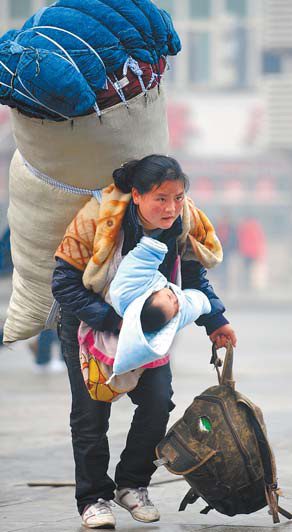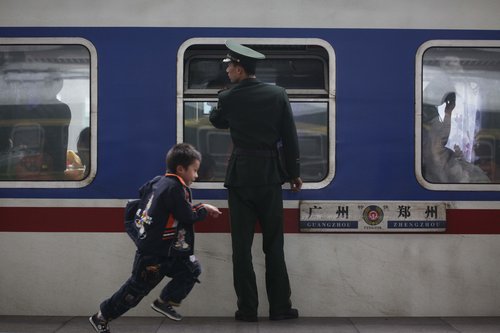Society
Big rush begins for reunions
By Zheng Caixiong in Guangzhou and Xin Dingding in Beijing (China Daily)
Updated: 2010-02-01 06:43
 |
Large Medium Small |
|
 A woman staggers under the load of carrying a child and heavy baggage as she tries to reach Nanchang railway station in Jiangxi province over the weekend. About 2.5 billion trips are expected over 40 days starting from Saturday.[China Daily/Zhou Ke] |
The Ministry of Railways said 4 million people traveled by train across China on Saturday and yesterday as Chinese began the yearly trip to their hometowns to celebrate the Spring Festival with family reunions.
The railway stations in Beijing, Shanghai and Guangzhou were the busiest, mainly packed with migrant workers heading home to central and western China.
Some 59 million passengers took buses over the weekend, the Ministry of Transport estimated.
The traffic flow is expected to peak during Feb 5 - 10, days before the Spring Festival, which falls on Feb 15 this year.
The real name ticketing system, on trial in Guangdong, Sichuan and Hunan provinces, led to fewer crowds or delays.
In Guangzhou railway station yesterday afternoon, Wang Xiangzhi was relaxed after his ticket was stamped with a seal, indicating his ID card matched the details on his ticket.
"It took me only several seconds to go through the procedures for having my ID card checked in the station square," said 35-year-old Wang, who is employed in a chemical factory near Guangzhou.
Media reports said many scalpers had quit their business this year because of the new system - but others appeared, selling IDs to people at the railway station square, according to the city-based Southern Metropolis Daily.
A reporter from the newspaper was asked by at least two persons on Saturday whether he wanted to buy an ID card, which must be shown when buying train tickets in Guangzhou railway stations.
The scalpers asked 80 yuan ($12) for an ID and promised that they were genuine. They also said the ID photo would bear as close a resemblance to the buyer as possible.
One of the scalpers surnamed Ge revealed that some of the ID cards were left in hotels by careless travelers, while others were thrown into garbage bins by thieves who pocketed the money in the stolen wallets.
A railway police officer surnamed Chen said police have opened a counter to help those who have lost ID cards to apply for a temporary one.
"If their data are correct, they will quickly be issued a temporary ID to buy tickets," Chen told China Daily.
But in other places, many travelers found train tickets were still difficult to secure this year, and some had to rely on scalpers as usual.
Yue Jinglun, a professor at the School of Government in Guangzhou-based Sun Yat-sen University, said that the real name ticket system can help fight scalpers, but does not tackle the problems large numbers of migrant workers have in buying railway tickets.
| ?
 |
|
A boy runs for his train inside a railway station in Guangzhou, South China's Guangdong province, January 31, 2010. [Photo/CFP] |
Yue urged railway departments to introduce an open, fair and transparent system in selling tickets during the annual rush period.
Yu Ran and Li Xinzhu in Shanghai, and Mo Xuan in Guangzhou contributed to the story












